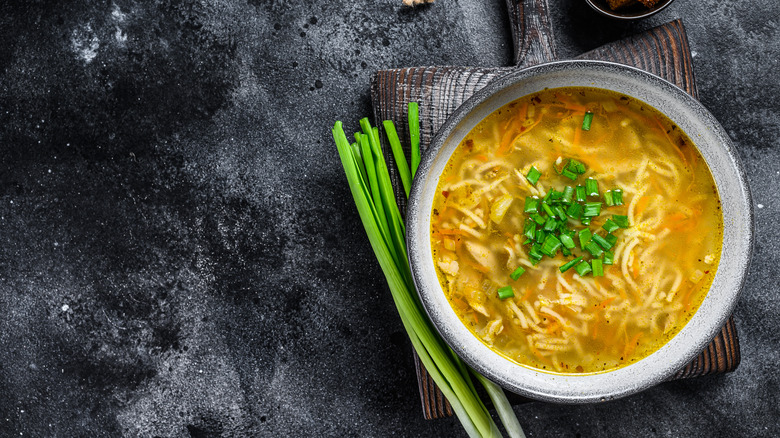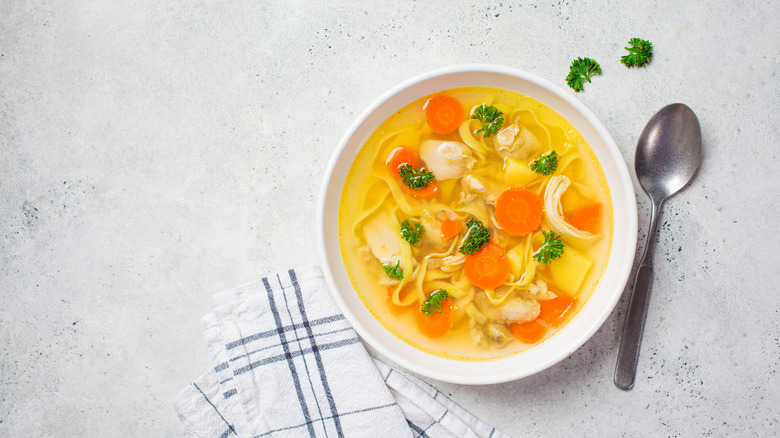Why You Should Eat Chicken Noodle Soup When You're Feeling Sick
Cough, runny nose, sore throat — the symptoms of a cold often take a toll on the body. No doubt, you can alleviate them with medication and rest. But what about nutrition? Does it affect the immune system?
According to Livestrong, when you're not feeling well, your body will need extra supportive nutrients to help defend itself and plenty of energy to fight off the infection, so eating regularly and well while sick is a must. Which ingredients play a role in supporting the immune system is still being researched, but one dish that contains various important nutrients is chicken soup.
Grandma's chicken soup is certainly a childhood memory for many. The strong, juicy broth was — and still is — a popular home remedy for colds. Chicken soup not only tastes good but also makes us feel warm inside. So does chicken noodle soup help when you're feeling sick? Are there proven advantages to the ingredients used?
Here's a rundown of some of the benefits.
Chicken noodle soup can be anti-inflammatory
Research conducted by Stephen Rennard, pulmonary and critical care professor at the University of Nebraska, suggests that chicken soup (a combination of chicken broth and cooked vegetables) may be an anti-inflammatory agent that helps the body recover from colds, sore throats, flu, and infections of the upper respiratory tract.
After Rennard's wife cooked a chicken soup of onions, sweet potatoes, celery, turnips, parsnips, carrots, and parsley, he examined the effects in detail. The study revealed that the activity of certain white blood cells (known as neutrophils), which are partially responsible for the inflammatory process, were inhibited or blocked after eating the soup.
To further explain, a study published in Mucosal Immunology illustrates that when viruses penetrate the mucous membranes during an infection, neutrophils and other white blood cells move there. The action of these immune system cells causes inflammation in the mucous membranes which leads to coughing and a runny nose. Stephen Rennard's study confirmed that chicken soup reduces the activity of white blood cells, which can therefore reduce inflammation and other cold symptoms.
Chicken soup offers carbs, protein, and hydration
Sandy Allonen, a clinical dietitian at Beth Israel Deaconess Medical Center in Boston, explains that chicken is high in tryptophan. This compound helps the body make serotonin, which improves your overall mood. The addition of noodles also provides much-needed carbohydrates for the ultimate satisfaction. Carbohydrates are found in most foods and are important suppliers of energy. They're made up of sugar molecules and are the preferred fuel for your muscles and brain. But that doesn't mean that all carbohydrate-rich foods taste sweet. Bread, potatoes, and pasta, for example, all contain a lot of carbohydrates, as does grain (via Medical News Today).
It's important to consume the right carbs. According to the Mayo Clinic, whole grains are a better source of complex carbs like fiber and starch which are better for your overall health. So when adding noodles to your soup, opting for whole grain noodles is best. Fiber-rich vegetables, lentils, and beans are also great additions.
No doubt further studies are needed to determine the additional benefits of chicken noodle soup and various other foods to eat when you have a cold or the flu. What is certain is that soup contributes to your daily hydration. According to Healthline, keeping yourself hydrated will help you feel better when suffering from a cold or flu. At least eight glasses of water daily is sufficient.
So the next time you catch a cold, you can safely follow your grandmother's advice and eat a bowl of hot chicken noodle soup.



